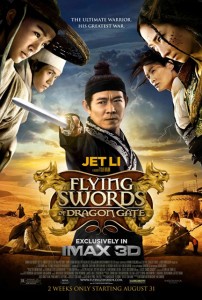Director: Tsui Hark
Cast: Jet Li, Kwai Lun Mei, Chen Kun, Zhou Xun, Li Yu Chun, Mavis Fan Hiu Huen, Fan Siu Wong, Du Yiheng, Sun Jian Kui, Viann Zhang Xin Yu
Running Time: 125 min.
By HKFantic
It was Jean-Claude Van Damme of all people who dubbed Tsui Hark ‘the George Lucas of Asia.’ Most likely because his 1983 fantasy film “Zu Warriors From the Magic Mountain” helped launch the special FX industry in Hong Kong. The comparison has turned out to be apt in more ways than one, however, as both legendary directors have arguably seen their careers derailed by an over-reliance on computer effects. Back before the CG revolution of 2001’s “Legend of Zu,” there was a certain ludicrous charm to Tsui Hark’s films when the effects were practical, in-camera, and the performers were clearly skilled at martial arts even when assisted by wires.
Now that computer effects allow Hark to do anything, his imagination feels strangely limited. “Flying Swords of Dragon Gate” is a movie full of incredible feats, whether it’s two people fighting inside of a swirling tornado or leaping from the top of a ship’s sails, but because it’s all rendered with CGI that looks less real than a video game, it’s hard for the viewer to connect with what’s happening onscreen – or care.
While Tsui Hark has a long history of classic Hong Kong movies to his credit, it’s 2011’s “Detective Dee and the Mystery of the Phantom Flame” that seems to be the new litmus test for Hark’s work. In other words: if you enjoyed “Dee” and its computer-enhanced reinvention of the wuxia genre, then you’ll probably find similar enjoyment in “Flying Swords.” If you disliked “Dee,” then this latest effort will really put you off.
“Flying Swords of Dragon Gate” is posited as a spiritual sequel to the Tsui Hark-produced “New Dragon Gate Inn,” but the story is all over the place and bears little resemblance to that 1992 effort. Several factions are competing for political power during Ming Dynasty era and they all happen to converge on the same lonely desert inn where a group of bandits are in search of a lost treasure. To Hark’s credit, he’s able to mine some considerable tension when our characters are constricted to the inn’s setting. It’s a dangerous place where your drink is likely poisoned and the meat on the spitroast may very well be human.
The film moves at a solid clip despite being two hours long, but after a late-film climactic battle in the middle of a sandstorm there’s still a solid twenty minutes left for our characters to explore a trap-ridden city buried underground. This is the point where viewers might be glancing at their watch, but so deep into Tsui Hark’s surreal vision – featuring CG swords that bend like rubber and an entire subplot hinging on two characters who randomly happen to look alike – you’re either completely immersed or you checked out a long time ago.
It’s difficult to criticize Tsui Hark when the man has produced and/or directed most of the films that we Hong Kong fans hold dear, but here’s hoping that his next endeavor is a bit less reliant on tossing computer-generated swords at the screen and more in line with the great storytelling of movies like “Peking Opera Blues” and “Time and Tide.”
HKFantic’s Rating: 6/10



